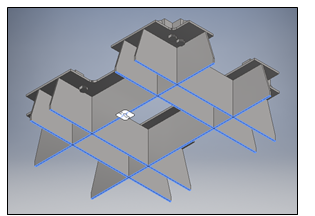Strength Analysis of Windlass Foundation on Hospital Auxiliary Ship by Using Finite Element Method
Main Article Content
Abstract
Indonesia is a country whose territory consists mostly of waters and islands, to support the health sector, especially for remote and inland areas and disaster emergency response activities, a means of transportation is needed that can cover and serve the area, one of which is the Hospital Auxiliary Ship (BRS). This ship is equipped with hospital facilities and infrastructure equivalent to a Type C Hospital. In its operation, the ship cannot be separated from mooring activities, therefore, the existence of a windlass as a supporting facility for lowering anchor activities is important. The windlass foundation must have optimal strength and efficiency by taking into account the reference or class as the standard used. With these considerations, this research was conducted to determine the optimality of the windlass foundation used by the Hospital Auxiliary Ship, by analyzing the maximum stress value, maximum deflection, and safety factor using the Finite Element Method. The analysis is carried out by providing load variations, namely ship loads and environmental loads. The simulation results will be compared with the calculation results based on Lloyd's Register Rules and Regulation and Biro Klasifikasi Indonesia (BKI) regulations. Reviewing the simulation results due to ship loads and environmental loads when the windlass angle is 0o, the maximum stress is 25.56 MPa, the maximum deflection is 0.01366 mm, and the safety factor is 7.81. Meanwhile, when the windlass angle is 25o, the maximum stress is 23.29 MPa, the maximum deflection is 0.01346 mm, and the safety factor is 8.58. Based on the results of calculations and analysis, it is concluded that several criteria with several angular positions formed by the windlass before and during operation still meet the criteria set by Lloyd's Register Rules and Regulation and Biro Klasifikasi Indonesia.
Downloads
Article Details

This work is licensed under a Creative Commons Attribution 4.0 International License.
Allow anyone to modify, improve, and make derivative works, even for commercial purposes, as long as they credit to you for the original work.
References
Biro Klasifikasi Indonesia. (2019). Rules For Classification And Construction : Vol. II Rules for Hull. Jakarta: Biro Klasifikasi Indonesia.
Lloyd's Register. (2018). Rules and Regulations for the Classification Ships. London: Lloyd's Register Group Limited.
Pusat Hidro-Oseanografi TNI Angkatan Laut. (2018, Agustus 28). Data Kelautan yang Menjadi Rujukan Nasional Diluncurkan. Retrieved April 8, 2021, from Official Website Of Pushidrosal: https://www.pushidrosal.id
Sugiyono. (2009). Metode Penelitian Kuantitatif, Kualitatif, dan R&D. Bandung: Alfabeta.
A. Y. Kyaw, “Application of Advanced Technology on Transport Ships as a Technological Revolution in the Maritime Industry”, Journal of Maritime Technology and Society, vol. 3, no. 2, pp. 67-72, Jun. 2024.

